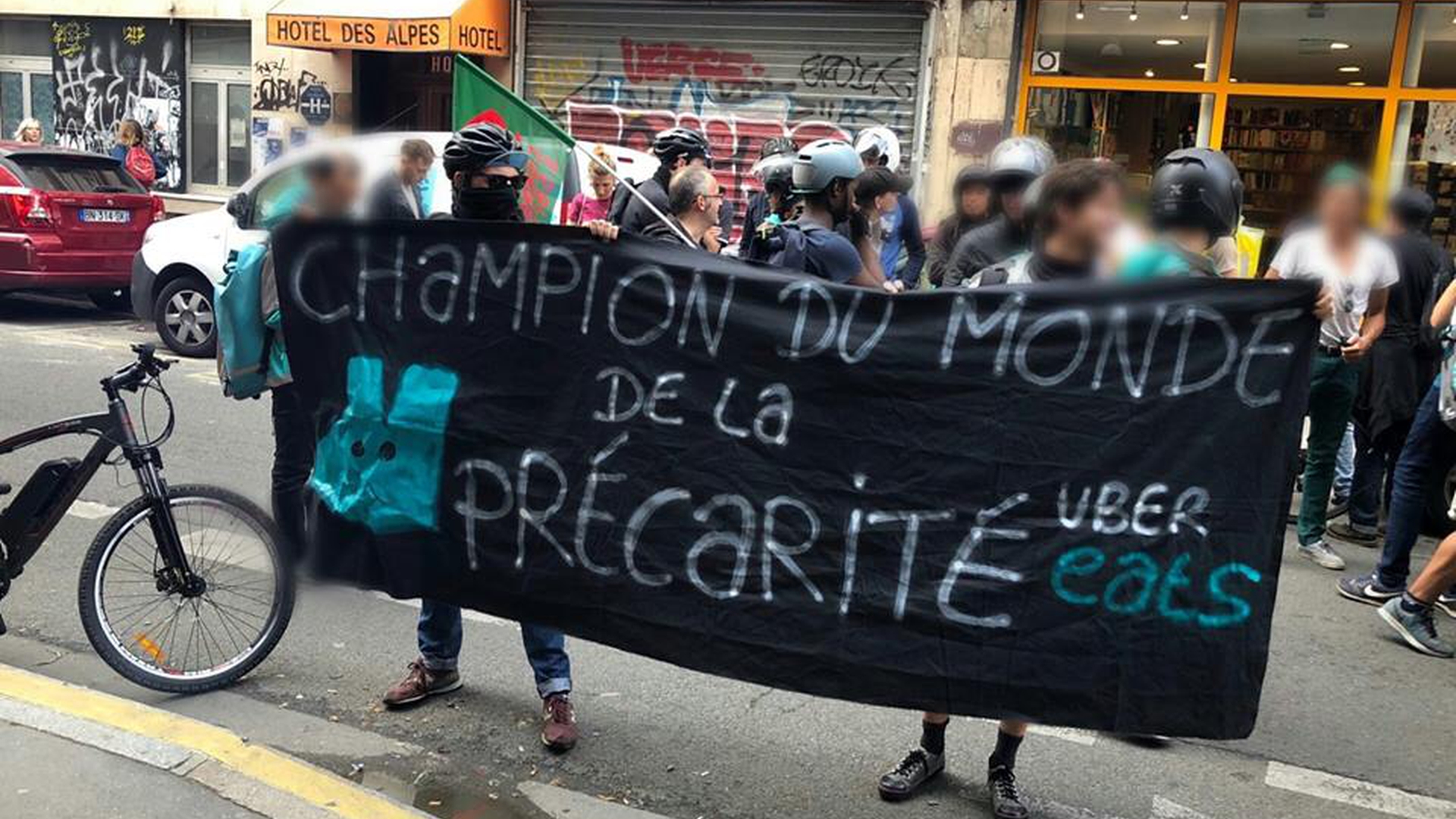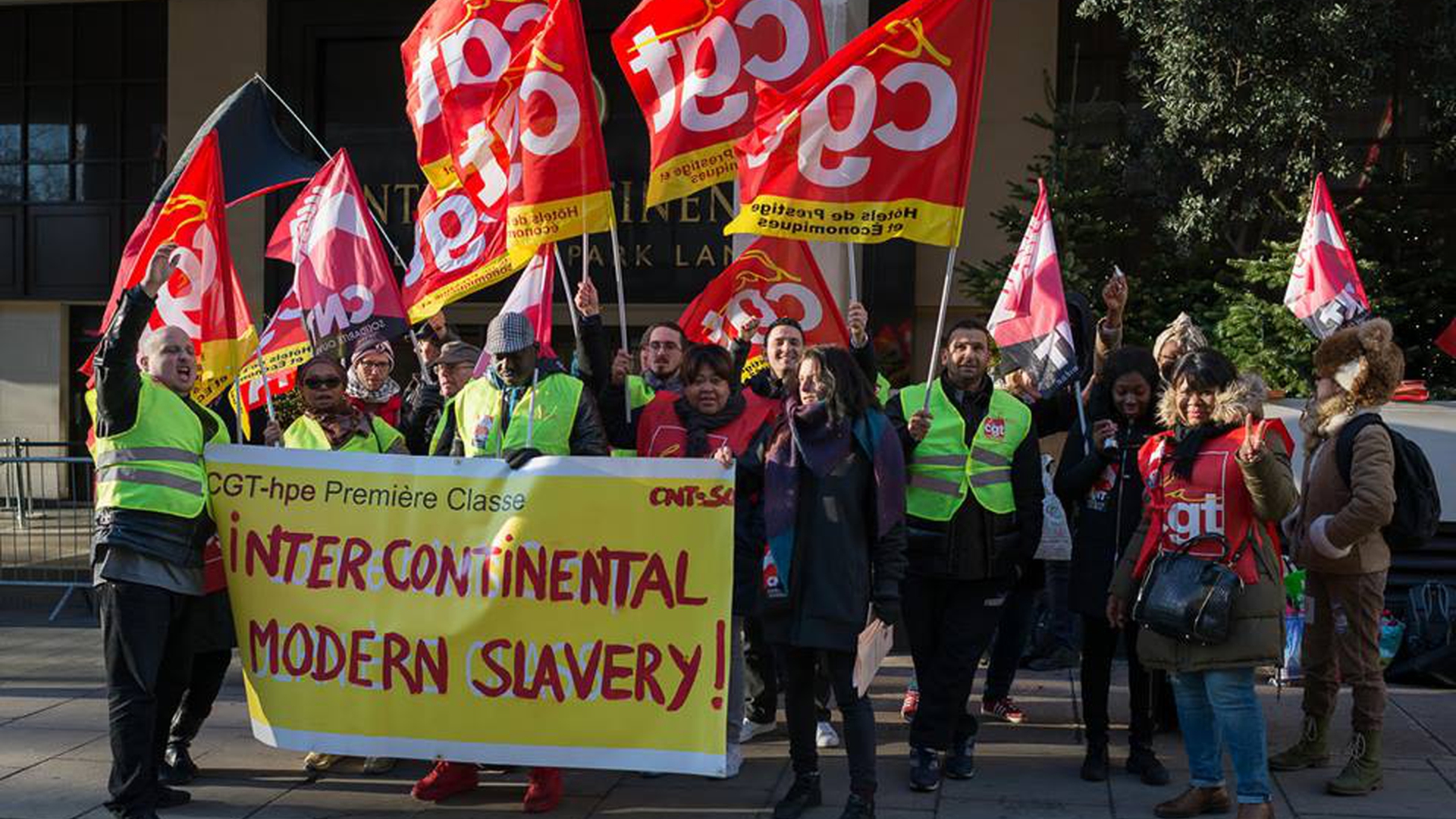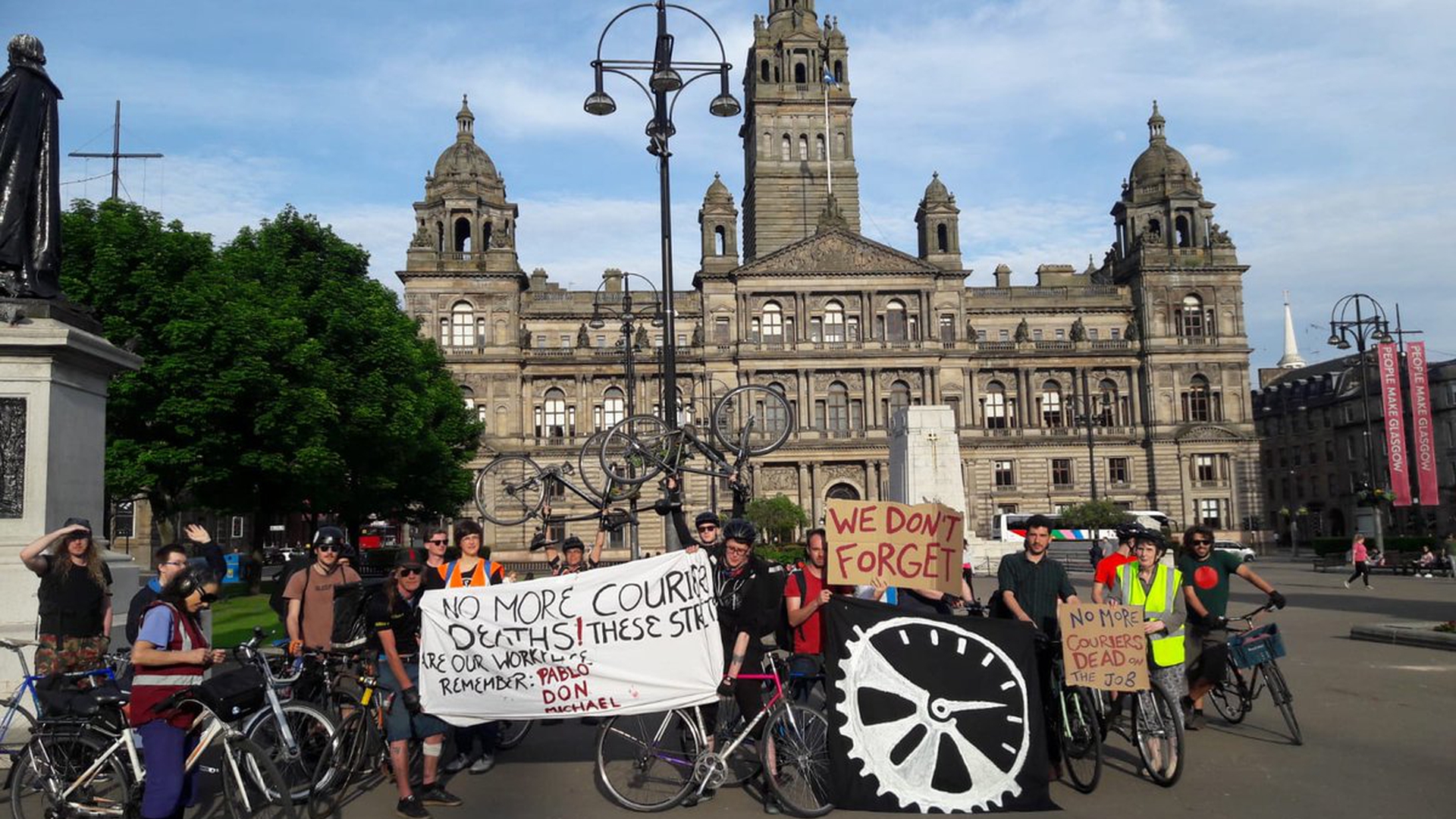More rider, more radical, more... break: An interview with French riders
by
Arthur Hay,
Callum Cant (@CallumCant1),
Steven Bouvier
October 31, 2018
Featured in The Transnational Courier Federation (#5)
‘Right now we are in struggle in Paris’

inquiry
More rider, more radical, more... break: An interview with French riders
by
Arthur Hay,
Callum Cant,
Steven Bouvier
/
Oct. 31, 2018
in
The Transnational Courier Federation
(#5)
‘Right now we are in struggle in Paris’
In October food platform workers from 12 states and 34 organisations met in Brussels for the founding meeting of the Transnational Federation of Couriers. This federation will represent platform workers across borders and lead a coordinated fight for better conditions in the sector. During the meeting, we interviewed a number of workers from across Europe to get a better understanding of the dynamics of the struggle.
Callum Cant is a Notes from Below editor
Arthur Hay is a rider from Bordeaux and member of the Syndicat de Coursiers a Velo de Gironde and the CGT
Steven Bouvier a rider from Paris and a member of the Collectif des Livreurs Autonomes de Paris and Sud Solidaries
Deliveroo arrived in France in 2015. At first it was good, everyone was well paid. Then in 2016, a company called TakeEatEasy, a Belgian company, went bust. After that, loads of riders were looking for another company. Deliveroo took over all the restaurant partners from TakeEatEasy and the riders too. One week later, they changed the pay structure (tarification).
Before we were paid €7.50 an hour plus €2/3/4 a drop depending on how long you’d been working. They were promising huge wages if you stayed for four months. It was awesome. Then there were the bonuses. if you worked Fri/Sat/Sun you got an extra €50. If it was raining, and in my city it rains a lot, you got €15 euros an hour. I was working 55 hours a week and taking the next week off to go somewhere.
But it didn’t last. They decided that they owned the riders, we didn’t have a choice, so the new workers coming to Deliveroo got a new deal: €5 a drop. And then the bonuses disappeared overnight. They were sending us emails: ‘oh, sorry, this doesn’t exist any more’, ‘Rain? No, it didn’t rain yesterday!’. It happened in a really short time, and the old riders from TakeEastEasy wanted to get organised. They lost 2 weeks of pay when the company went bust, they didn’t get their last paycheque. We made groups in most of the cities. At that time there were only big cities with the platforms.
How many cities?
Lyon, Marsailles, Bordeaux, Paris, Nantes, Lille - I think one more as well, seven cities. There were groups of people talking about how we could respond.
This was in September 2016, just after the London strike. I remember we were talking a lot about what you were doing in the UK, that movement was the inspiration. It showed us it was possible to get organised, and we decided to do the same. We met, 30 to 50 of us, and chatted about the job. We didn’t organise. There were no actions taken. We just had a good chat, there was nothing tactical in it. Myself and a few others decided to prepare meetings in all the places and get more organised. We would meet not just to talk about our last delivery but how to get organised and how to impact the company.
I decided with a few other to go to CGT, the biggest union in France. In my mind it was like: sure, we won’t get 50 persons there, because the youth don’t want anything to do with unions. Basically they think you’re a communist if you’re in a union, especially the CGT. So we were more like 10, 12, sometimes less. But we were finally getting organised. We gave people tasks and they did them.
In Bordeaux when they changed the pay they fired all the people with old contracts and hourly pay. In one hour we knew what to do - boom boom boom, and the day after we organised a strike. That was 26th July 2017. Then on the 27th Paris and Lyon did the same. It was huge. We had a big impact on public opinion. And so we succeeded in getting an appointment with the top management of Deliveroo in France. So we met for four hours, but then they said: ‘Ok, nice to talk to you, but the law doesn’t oblige us to listen to you s this was not a negotiation’. After that we tried to do other strikes but we lost momentum. It was hard, but we kept the strike for almost two weeks. Then it fell apart.
Now in the union in Bordeaux, we have suffered with turnover. The organising team is smaller, and the union is not so strong. But we keep going, there will be a strike on Friday (26th October) following Paris, because they did a strike last Friday that worked perfectly.
I find it very hard to keep track, but Paris must have been on strike eight times now?
Yes, I think about eight.
And then there has been action in other cities all over France, they have been on strike over and over again.
We have tried to make a national union of all the riders, but it has been difficult to organise everyone to do everything at the same time. There is local reality to contend with. Sometime you’re alone, sometimes there are a lot of bikers who want to fight, who want to struggle. So, for the moment we can’t coordinate exactly - the same day, the same hour. But we have the skeleton of a national organisation called CAVAL: it translates as something like, ‘coordination of action towards the autonomy of riders’.
Earlier, a worker from Paris announced that the threat of a blockade of a dark kitchen site had led to Deliveroo promising to negotiate with workers. What’s the situation?
Right now we are in struggle in Paris. Two weeks ago, we had a strike on Sunday night over changed to the pay structure, we were like forty strong. After the strike we had a general assembly, like we do after every strike. It’s the best way to plan and keep riders involved. We were asking each other what the next steps would be.
We decided to go to the Deliveroo offices, and we were chatting a lot with other bikers during the week. We were fifty strong the next action. They just closed the door and didn’t want to meet us. So, we did the same thing last week. This time we were eighty strong. We were getting more and more numbers. We said okay, they have closed the doors again, that night we will have a strike. We blockaded lots of key restaurants and got them to turn the application off. Deliveroo didn’t work in Paris at all that night.
Was this groups of two or three riders going restaurant to restaurant?
It was just two groups of 25 workers. They just said, ‘hello can you stop using Deliveroo tonight to support our struggle?’ And a lot of them said yes, no problem, we can do it for one or two hours. We did the same thing Sunday. So three days of strike in two weeks. They said then that they could meet up ‘if you are not violent’ etc. Today they saw about the next action, the editions blockade, and they said again they wanted to meet. The editions kitchens are where they make a lot of their money, they are like restaurant-factories, so blockading them is very powerful. We have invited the French boss to come chat with us at the blockade. For the next negotiation we will have the balance of power [rapport de force]. We want to meet on our terms.
The first condition would be: this is a negotiation, not just a meeting.
That would be the first time ever, right. Deliveroo have never collectively bargained with workers before.
If it happens!
What is the role of migrant workers in this struggle?
There is not a lot of migrants in the struggle, because they’re really more precarious than us.
They’re undocumented (sans papier)?
Yes, they don’t have papers. It’s difficult for us. Maybe we should write something in English or Urdu specifically talking about these questions, but at the moment it is a goal we have yet to achieve. Many of these workers are working on someone else’s account, and that person takes a percentage.
Like a mafiosi
So if they struggle they could have a problem from the person who owns the account.
Where is the struggle going in France?
More rider, more radical, more… break.
Featured in The Transnational Courier Federation (#5)
Subscribe to Notes from Below
Subscribe now to Notes from Below, and get our print issues sent to your front door three times a year. For every subscriber, we’re also able to print a load of free copies to hand out in workplaces, neighbourhoods, prisons and picket lines. Can you subscribe now and support us in spreading Marxist ideas in the workplace?
Read next


